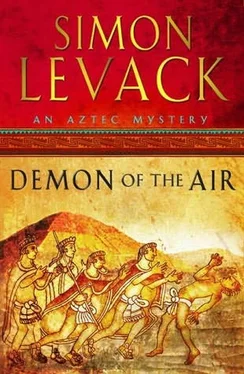Simon Levack - The Demon of the Air
Здесь есть возможность читать онлайн «Simon Levack - The Demon of the Air» весь текст электронной книги совершенно бесплатно (целиком полную версию без сокращений). В некоторых случаях можно слушать аудио, скачать через торрент в формате fb2 и присутствует краткое содержание. Год выпуска: 2012, Издательство: St. Martin, Жанр: Исторический детектив, на английском языке. Описание произведения, (предисловие) а так же отзывы посетителей доступны на портале библиотеки ЛибКат.
- Название:The Demon of the Air
- Автор:
- Издательство:St. Martin
- Жанр:
- Год:2012
- ISBN:нет данных
- Рейтинг книги:4 / 5. Голосов: 1
-
Избранное:Добавить в избранное
- Отзывы:
-
Ваша оценка:
- 80
- 1
- 2
- 3
- 4
- 5
The Demon of the Air: краткое содержание, описание и аннотация
Предлагаем к чтению аннотацию, описание, краткое содержание или предисловие (зависит от того, что написал сам автор книги «The Demon of the Air»). Если вы не нашли необходимую информацию о книге — напишите в комментариях, мы постараемся отыскать её.
The Demon of the Air — читать онлайн бесплатно полную книгу (весь текст) целиком
Ниже представлен текст книги, разбитый по страницам. Система сохранения места последней прочитанной страницы, позволяет с удобством читать онлайн бесплатно книгу «The Demon of the Air», без необходимости каждый раз заново искать на чём Вы остановились. Поставьте закладку, и сможете в любой момент перейти на страницу, на которой закончили чтение.
Интервал:
Закладка:
The ball itself was a dark blur among the jostling bodies, taking a solid shape only in the instant when it was stopped by a hip, a thigh or a buttock. The players were not allowed to use their hands or feet, except to spring off the ground when they fell. Splashes and streaks of blood on the earth showed where players had fallen and got up again. The air above the court was full of the smells of blood and sweat, mixed with an elusive animal scent of high excitement.
You could not help getting caught up in the game. We spectators leaned forward, craning our necks to follow the ball’s flight and the hurtling, crashing bodies of the players. Nobody cheered, called out or even spoke above a whisper, even when a player did a full somersault to catch the ball at an improbable angle and drive it off the wall and into his opponents’ half of the court. We could never lose sight of the fact that this was more than a game: it was a sacred ritual, one of the ways through which the gods revealed their will, and the dark-robed priests stationed on either side of the court were not just there to award points and punish fouls.
Some of those watching the game would be hoping it would tell them their fortunes. Others hazarded more than their fate, or less, depending on your point of view. Spread out before us, between us andthe court, were money and goods of every kind: bags of cocoa beans, loads of cloth, copper axes and quills full of gold, jeweled lip-plugs and other adornments, fresh squashes, turkeys and quails, folds and sheets of the best paper from Amatlan or Amacoztitlan, and the most precious and delicate thing of all: feathers. Right in front of me was a bundle of the most beautiful scarlet feathers, the kind the merchants and tribute collectors got from distant provinces far to the south, but as stiff and full of color as if they had just been plucked.
The only rule about betting was that the stakes must be displayed in full view of the players. This was the law my master had broken with his secret wagers with Curling Mist. The reason for it was connected with two small stone rings, not much more than a hand’s breadth across, set into the walls of the court at twice a man’s height. A team that managed to get the ball through one of them would win everything that had been staked on the game. I had never seen this happen, and I knew no one who had.
The man who had performed the somersault picked himself up, hobbled about for a moment and then hopped to the back of the court while a teammate rushed forward to intercept the ball. One leg was already swelling up: after the game they would have to let the pooled blood out with obsidian razors.
I reminded myself that I was here to look for someone, not watch the game, but when I glanced at the tiers of seats opposite and around me I saw only the sort of crowd these events usually drew. Most had the short, coarse cloaks and tonsured hairstyles of commoners who had never taken a captive and never would. A few, occupying seats reserved for them at the front, were more gaudily dressed, their lips and ears punctured by jewels that glittered as they chatted to one another. The ball game attracted the very poor, pinning all their hopes on one big win, and the very rich, who could afford to lose. None of the spectators obviously had anything to do with the merchant class and its discreet wealth. And none of them was female.
Perhaps she had been here and left, I thought. I tried asking my neighbors.
I could not see the face of the person on my right, as he was leaning forward in his seat with his eyes fixed on the game being played out below us, but I could tell that he had not yet had his head shaved to mark his first capture of an enemy warrior. He wore no cloak, andfrom the sleek muscle coating his shoulders and back, I thought he might be a ballplayer himself. I had more luck catching the eye of the commoner on my left.
“Come to a lot of these games?” I asked conversationally.
He grinned. “Whenever I can. Whenever the Governor’s team from Tlatelolco are playing, anyway, but I try to catch all the games-even crappy practice sessions like this one. You?”
“Oh, you can’t keep me away.” The players were taking up their positions, ready to contest the next point. Sweat made their bruised bodies glisten, where they were not caked with dust, and the earth under their feet was mottled with their drying blood. It would not have occurred to me that this was anything other than a competitive match.
“There’s a good crowd here,” I said casually, keeping up the pretense of having a conversation until my neighbor’s attention strayed back to the game.
“Not bad,” he said noncommittally.
“I was wondering …”
He turned to me in exasperation. “Are you watching this or not?”
I edged away from his glare. “Sorry,” I said. “It’s just that I was looking for someone.”
He gave the ball court a longing glance before deciding that the quickest way of getting rid of me was to answer my questions as concisely as possible. “Well, who is he, then?”
“She, actually. Her name’s Lily.”
He fell into a furious fit of coughing. As soon as he recovered he said: “Oh, so it’s like that, is it? You picked an odd place to meet her, then. Wouldn’t a garden have been better?”
“Better for what?” I stared at him, suddenly confused. I wondered whether he thought I had been planning an assignation, and then realized that that was exactly what he had thought because it was what I would have thought as well, had I been in his place.
“Well, you know-”
“No, I don’t,” I snapped. “Look, I’m not talking about a pleasure girl-she’s a merchant’s widow and the mother of another.” I felt a sudden urge to pitch him over the backs of the seats in front of us and all the way down into the bottom of the court, just to wipe the knowing, lascivious smirk off his face. “Now have you seen her or not?”
Indifferent to my anger, my neighbor turned back to the game. “Sorry, friend, but I can’t help you …”
I did not hear whatever else he might have had to say.
It had been just a blur of movement out of the corner of my eye, but the play had sent a ripple of appreciative murmuring through the crowd and one or two of the spectators were standing. The ball had come to rest on the short strip running across one end of the court and the team whose half it was in were standing around it. Judging by their gestures and the fragments of agitated speech that drifted up to where I sat, they were exchanging views among themselves about how it had got there and whose fault it was.
“Oh yes!” The burly youth on my right was one of those on their feet. He turned to me. “You saw, didn’t you? That was a classic! The ball can’t have been more than a hand’s breadth off the ground when he returned it! That …”
His voice tailed off as he saw me staring at him. Then the shock of recognition widened his eyes until they were as round as the ball.
It was Nimble, Curling Mist’s son and messenger.
He made an inarticulate noise and turned, trying to scramble out of his seat and clamber up over the tiers above us.
“Hey!” cried someone in the row behind me. “Sit down! We can’t see!”
“You can’t get out this way. What do you think you’re doing?”
I reached up, grabbed the lock of hair hanging from the back of the youth’s head and yanked it firmly. He howled in pain and staggered backward.
“You heard them,” I growled. “Sit down!”
He slumped back in the seat next to me and glowered at me.
I said nothing. I was so astonished to see him there that for a moment I could think of nothing to say. I could only stare and marvel at the gods and their sense of humor. It was hard to believe that even the capricious Smoking Mirror would be so perverse as to put this youth, of all people, in the seat next to mine.
Читать дальшеИнтервал:
Закладка:
Похожие книги на «The Demon of the Air»
Представляем Вашему вниманию похожие книги на «The Demon of the Air» списком для выбора. Мы отобрали схожую по названию и смыслу литературу в надежде предоставить читателям больше вариантов отыскать новые, интересные, ещё непрочитанные произведения.
Обсуждение, отзывы о книге «The Demon of the Air» и просто собственные мнения читателей. Оставьте ваши комментарии, напишите, что Вы думаете о произведении, его смысле или главных героях. Укажите что конкретно понравилось, а что нет, и почему Вы так считаете.












